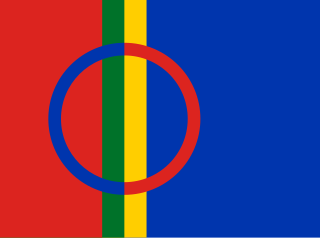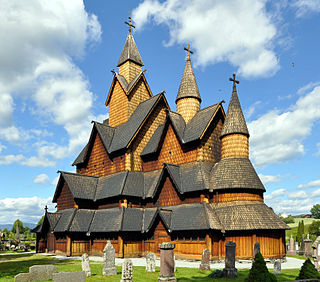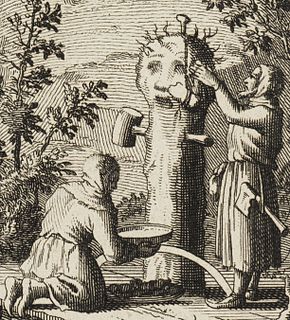Related Research Articles

The Sámi people are a Finno-Ugric-speaking people inhabiting the region of Sápmi, which today encompasses large northern parts of Norway, Sweden, Finland, and of the Murmansk Oblast, Russia, most of the Kola Peninsula in particular. The Sámi have historically been known in English as Lapps or Laplanders, but these terms are regarded as offensive by some Sámi people, who prefer the area's name in their own languages, e.g. Northern Sami Sápmi. Their traditional languages are the Sámi languages, which are classified as a branch of the Uralic language family.

Sápmi is the cultural region traditionally inhabited by the Sámi people. Sápmi is in Northern and Eastern Europe and includes the northern parts of Fennoscandia, also known as the "Cap of the North".
A creator deity or creator god is a deity or god responsible for the creation of the Earth, world, and universe in human religion and mythology. In monotheism, the single God is often also the creator. A number of monolatristic traditions separate a secondary creator from a primary transcendent being, identified as a primary creator.

Laestadianism, also known as Laestadian Lutheranism and Apostolic Lutheranism, is a pietistic Lutheran revival movement started in Sápmi in the middle of the 19th century. Named after Swedish Lutheran state church administrator and temperance movement leader Lars Levi Laestadius, it is the biggest pietistic revivalist movement in the Nordic countries. It has members mainly in Finland, Northern America, Norway, Russia and Sweden. There are also smaller congregations in Africa, South America and Central Europe. In addition Laestadians have missionaries in 23 countries. The number of Laestadians worldwide is estimated to be between 144,000 and 219,000.

Traditional Sámi spiritual practices and beliefs are based on a type of animism, polytheism, and what anthropologists may consider shamanism. The religious traditions can vary considerably from region to region within Sápmi.

A Sámi drum is a shamanic ceremonial drum used by the Sámi people of Northern Europe. Sámi ceremonial drums have two chiefly two variations, both oval-shaped: a bowl drum in which the drumhead is strapped over a burl, and a frame drum in which the drumhead stretches over a thin ring of bentwood. The drumhead is fashioned from reindeer hide.

Lars Levi Laestadius was a Swedish Sami pastor and administrator of the Swedish state Lutheran church in Lapland who founded the Laestadian pietist revival movement to help his largely Sami congregations, who were being ravaged by alcoholism. Laestadius was also a noted botanist and an author. Laestadius himself became a teetotaller in the 1840s, when he began successfully awakening his Sami parishioners to the misery and destruction alcohol was causing them.

Bjarmaland was a territory mentioned in Norse sagas since the Viking Age and in geographical accounts until the 16th century. The term is usually seen to have referred to the southern shores of the White Sea and the basin of the Northern Dvina River as well as, presumably, some of the surrounding areas. Today, those territories comprise a part of the Arkhangelsk Oblast of Russia, as well as the Kola Peninsula.

Religion in Norway is dominated by Lutheran Christianity, with 68.7% of the population belonging to the Evangelical Lutheran Church of Norway in 2019. The Catholic Church is the next largest Christian church at 3.1%. The unaffiliated make up 18.3% of the population. Islam is followed by 3.4% of the population.

In Sami shamanism, Horagalles, also written Hora Galles and Thora Galles and often equated with Tiermes or Aijeke, is the thunder god. He is depicted as a wooden figure with a nail in the head and with a hammer, or occasionally on shaman drums, two hammers. It has been suggested that name is derived from that of the Norse god Thor.

Adnan Sami Khan is an Indian singer, musician, music composer, and pianist. He performs Indian and Western music, including for Hindi movies. He has been awarded with Padma Shri for his remarkable contribution in music. His most notable instrument is the piano. He has been credited as "the first musician to have played the santoor and Indian classical music on the piano". A review in the US-based Keyboard magazine described him as the fastest keyboard player in the world and called him the keyboard discovery of the nineties.

Rana Niejta and Rana Niejte are Ume Sami names on a goddess in Sami mythology. In Northern Sami she is called Rana Neida and Rana Neide.
Lars Nilsson was a Sami who was burned at the stake for being a follower of the old Sami religion in Arjeplog in Sweden during the time of the Christianization of the Sámi people.
Radien-attje, Jubmel, Waralden Olmai, Maylmen Olmai, Vearalden Olmai or Waralden Olmai is the superior or celestial deity of the Sami. He is also called Jubmel or Ibmel, a parallel to the Finnish Jumala (god).
Raedieahkka or Radien-akka is a goddess in the Sami mythology. She is the wife of the Sami high god Radien-attje, and the mother of Rana Niejta and Raediengiedte.
Ipmil or Ipmilbalolaš means God in the Northern Sami language.

The Epistles of Wisdom or Rasa'il al-Hikmah is a corpus of sacred texts and pastoral letters by teachers of the Druze Faith native to the Levant, which has currently close to a million practitioners.
Events in the year 1752 in Norway.
Sami, also spelt as Samee and Sameeh, is an Arabic male given name literal meaning is "one who hears" or "sharp, keen hearing", "keen, vigorous, intense attentiveness [listening]", "pious, loyal, dutiful, obedient, compliant", "hearer, listener". The name is an exaggerated form which stems from the original form of the male given name Sami.

Events from the year 1693 in Sweden
References
- ↑ "BEIVVE Sami Sun Godess [sic]". www.tjatsi.fo. Archived from the original on 2012-02-05. Retrieved 2019-09-08.
- ↑ Karsten, Rafael, Samefolkets religion: de nordiska lapparnas hedniska tro och kult i religionshistorisk belysning, Stockholm, 1952